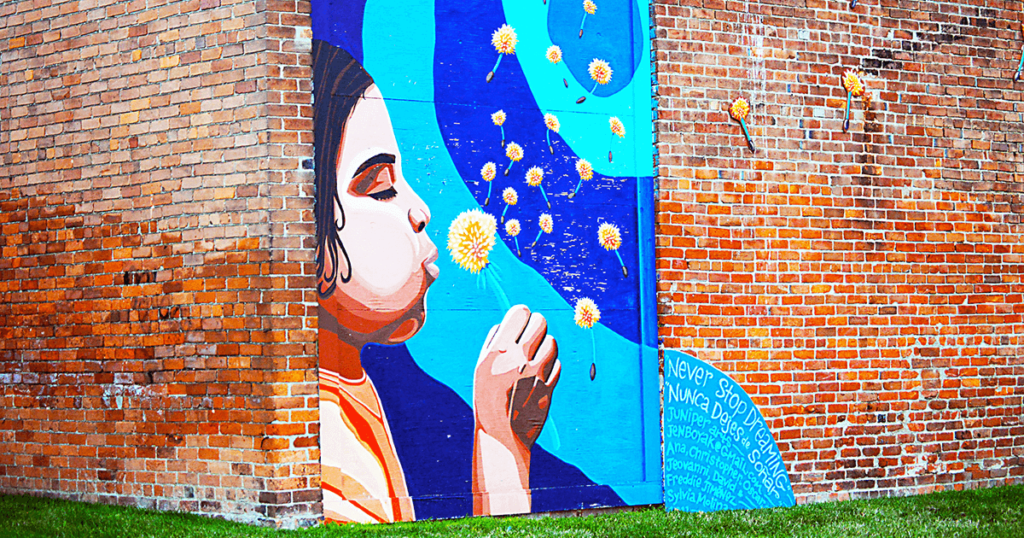
Let’s go. Let’s go, now, calls an impatient Teenager-Celia, three hours before her favorite band—a seven-piece indie group called Los Campesinos!—is set to take the stage. Mind you, this kid is rarely voluntarily early for anything under the sun. But here we are on a Friday evening, Husband-Steven and I still ensconced in Facebook-surfing (Steven) and essay grading (me), and we’re being harangued by our near-to-perfect daughter for dillydallying.
Still, we get it, Steven and I, that raucous, belly-clenching thrill that comes before concerts. After all, we’re both punk rockers (Steven more than me) and new-wavers (me more than Steven), and just all-around rock & rollers from way back, from Detroit’s pounding, surging new music scene of the late ’70s (S) and early ’80s (me). In this way, Teenager-Steven and Teenager-Laura lived parallel lives; we each drove from our upscale suburbs—where our parents landed after the ’67 uprisings—to various neighborhoods, various music clubs, from Clutch Cargos in dilapidated (at the time) Downtown, to Freezer Theater in the (then) down-and-out Cass Corridor, to Paycheck’s in Hamtramck (not officially Detroit, but a little nubbin of a city swallowed whole by Detroit’s borders). To Bookies and Todd’s and Fox Theater, all for the sounds that hooked us, that never once let go, not for decades now.
The point is, Steven and I share Celia’s ecstasy (maybe 60 percent of it, but she’s got a lot) about seeing Los Campesinos! tonight. And they rock, no doubt! The dark, edgy lyrics, the big sound, and big feelings—what’s not to love? They’re playing El Club, an all-ages venue that sprang up a year ago in Southwest Detroit—in Mexicantown, to be precise, where Steven and I once restored a grand house on Grand Boulevard. And I’m excited to finally check it out, this newish addition to Detroit’s music scene, and to see the latest changes stirring my old neighborhood.
Mexicantown is comprised of Hubbard Farms and its sister neighborhood, Hubbard Richard. It’s home to geodesic domes, a tortilla factory, and the best botanas and margaritas in the state, as well as lots of Spanish speakers. It’s also holding its own in this new Detroit we’re inhabiting—though its property values aren’t surging, yet, the area’s itching to explode. Witness construction on once-vacant fields, abandoned buildings newly repurposed along Vernor Highway, murals and gardens aplenty in this community of immigrants and their descendants (and artists and college students and hipsters, as they scatter like dandelion seeds across certain, choice areas of our city).
Yet that immigrant population, the very one that electrifies Mexicantown and gives it its name, is hunkering down at the moment—because of ICE seeking out the undocumented, to deport them lickety-split. Speaking of ICE, they recently carried out raids at Saint Anne Church and the Hope of Detroit Academy, this as parents dropped off their kiddies for school! Now some of our old neighbors won’t leave their homes for fear of being snatched, and for many others, this year’s Cinco de Mayo parade was more stressful than celebratory, the low rider cars dancing along Vernor with less abandon than usual …
… or so I’ve been told. Sadly, I didn’t attend this year. In fact, I rarely get to the old neighborhood anymore. In this way, I’m like lots of my fellow Detroiters who, for various reasons, cling to their separate patches of the city. Blame size, Detroit being 139 miles huge. Blame exhaustion or lack of reliable public transportation. Or maybe it’s as simple as this: for the longest time, we were simply abandoned, forgotten, ignored—by state government in Lansing, by corrupt or inept city officials, by our affluent suburbs, even by family and friends who flat out refused to visit. We Detroiters aren’t quitters, but we got used to going it alone—so we too often do.
Even after our bankruptcy, the Great Going-Bust, the Incredible Beggaring, I fear we haven’t learned the knack of talking to each other: the newcomers and old-timers, the mansion-neighborhoods and barely-eking-by-neighborhoods, the block clubs and committees and thousands of house-islands still standing amid acres of prairie. Too often we work at cross purposes—like band members occupying the same big stage, all of us strumming and stomping and warbling our separate compositions, making a big noise, but no real impact …
… unlike Los Campesinos!, who are tight as can be, who are shortly to rock El Club in Mexicantown. So that Celia and her buddy Katina hum louder and louder, taptap their Doc Martin’d feet against the backs of our seats as we make the longish drive across the city. And as I-75 unspools outside my passenger window, I consider all the live music happening right this second at dozens of Detroit venues. I think about Detroit’s vast musical legacy—way more than I can write on this page—Motown and R&B, jazz and hip hop, techno, soul (go Aretha!). And rock-and-roll. Even Los Campesinos!, who come from Wales but wouldn’t exist without the Detroit sounds that came first.
And I say this to Steven as the girls loudly ignore us from the backseat, and he nods, since I’m stating the obvious. Then he comments that, like all music, rock & roll is inherently inclusive. Never mind the guy plucking his bass strings in his mom’s basement, or the sighing teen replaying breakup songs over and over. Rock is best enjoyed live, with lots of humans around you, breathing to the beat, utterly connected, fixed in the present tense. Like guitar-meditation, I say, and Steven nods again.
So when Celia and Katina ditch us immediately upon entering El Club, that’s okay. We’re still hearing the same notes, same drum-pulse and words, in the same bubble of space—Celia and K pressed to the stage, Steven and I swaying in back on our own Doc Martin’d feet. Where, after the last finale, the girls track us down, both of them replete, understanding that for this single moment, anything—in this coming-back city, in this wide world we share—is possible.

